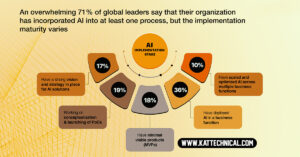What are the potential benefits of this artificial intelligence?
Artificial Intelligence (AI) has changed the way we live, work, and interact with technology. In this article, we will talk about The Game-Changing Potential of Artificial Intelligence. AI-powered systems are now able to perform complex tasks, learn from data, and make predictions with a level of accuracy that was once thought impossible. As a result, AI has become a game-changer for many industries, from healthcare and finance to manufacturing and transportation. In this article, we will explore the purpose and possibilities of AI and how it can change our world.

What is the Potential of Artificial Intelligence (AI)?
Artificial Intelligence refers to the ability of machines to perform tasks that typically require human intelligence, such as recognizing speech, making decisions, and learning from experience. AI is achieved through a combination of machine learning, deep learning, natural language processing, and other advanced technologies.
The Purpose of AI:
The purpose of AI is to make our lives easier by automating repetitive or complex tasks and making better decisions based on data. AI can also help us discover patterns and insights that are not immediately visible to humans, which can lead to new discoveries and innovations. In healthcare, for example, AI-powered systems can help doctors diagnose diseases faster and more accurately, while in manufacturing, AI can optimize production processes and reduce waste.

The Possibilities of AI:
The possibilities of AI are endless, and we are only just scratching the surface of what this technology can do. AI can help us address some of the biggest challenges facing humanity, such as climate change, food security, and healthcare. In agriculture, for example, AI-powered systems can help farmers increase crop yields and reduce the use of pesticides and fertilizers. In transportation, AI can optimize traffic flow and reduce congestion, making our cities more livable.
The Impact of Artificial Intelligence:
The impact of AI is already being felt across many industries, and it is only set to increase in the coming years. AI-powered systems are already transforming healthcare, finance, retail, and many other sectors, and they will continue to do so as the technology becomes more advanced. However, the impact of AI is not without its challenges, such as the potential loss of jobs and the ethical implications of using AI in decision-making.
The Biggest Potential of AI?:
The future of AI is exciting, but it is also uncertain. While AI has the potential to change our world for the better, it also poses significant risks if not developed and used responsibly. As such, it is important for policymakers, researchers, and industry leaders to work together to ensure that AI is developed in a way that benefits humanity as a whole.

AI and Education:
AI has the potential to revolutionize education by making learning more personalized and accessible. AI-powered systems can analyze student data to identify areas where a student may be struggling and provide targeted recommendations for improvement. Additionally, AI-powered chatbots and virtual assistants can provide students with immediate support and guidance, reducing the burden on teachers and improving student outcomes.
AI and Cybersecurity:
AI can also play a crucial role in cybersecurity by identifying and mitigating threats in real time. AI-powered systems can analyze massive amounts of data to detect patterns that may indicate a potential security breach. Additionally, AI can be used to develop more secure authentication systems, reducing the risk of data breaches and cyber-attacks.
AI and Customer Service:
AI-powered chatbots and virtual assistants can also be used to improve customer service by providing immediate assistance to customers 24/7. AI-powered systems can analyze customer data to identify common issues and provide targeted recommendations for resolution, reducing the need for human intervention.
AI and Social Media:
AI can also be used to improve social media by providing more personalized recommendations and reducing the spread of misinformation. AI-powered systems can analyze user data to provide tailored content recommendations based on interests and preferences. Additionally, AI can be used to identify and flag fake news and other types of misinformation, reducing its impact on social media users.

AI and the Environment:
AI can also be used to address environmental challenges, such as climate change and pollution. AI-powered systems can be used to analyze environmental data and identify patterns and trends, providing insights that can inform policy decisions and conservation efforts. Additionally, AI can be used to develop more efficient energy systems and reduce waste, helping to reduce the impact of human activity on the environment.
AI and Ethics:
As AI becomes more advanced and more widely used, ethical considerations become increasingly important. AI-powered systems must be developed and used in a way that respects individual privacy and human dignity. Additionally, AI must be used in a way that does not perpetuate existing biases or discrimination. To ensure the responsible development and use of AI, policymakers, researchers, and industry leaders must work together to establish ethical guidelines and best practices.
Conclusion:
AI has the potential to revolutionize the way we live, work, and interact with technology. It can help us solve some of the biggest challenges facing humanity, from climate change and healthcare to education and cybersecurity. However, the impact of AI is not without its challenges, and it is important to ensure that the technology is developed and used responsibly. As such, it is up to all of us to explore the purpose and possibilities of AI and work together to create a future that benefits everyone.
